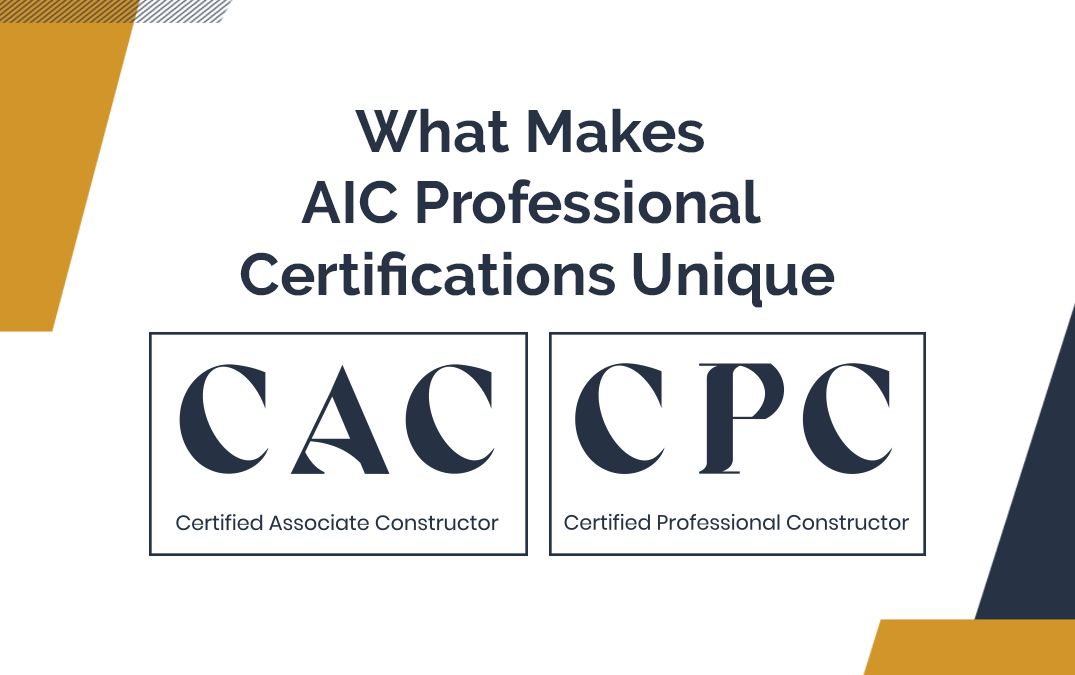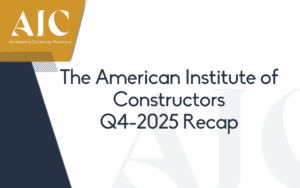Construction professionals have the opportunity to advance in their careers through professional certifications. This is why it’s essential to know how to select the ideal certification. In this article, we will provide you with an overview of professional certifications and their benefits.
We will cover the major differences among the certifications provided by three major organizations, including an AIC professional certification. Providing you with this information will help you select the most appropriate certification that can support you on your career path.
What Are Professional Certifications for Constructors?
Professional certification is the process by which a person proves that he or she has the knowledge, experience, and skills to effectively perform designated job tasks associated with a specific profession.
The award of the professional certification is earned by demonstrating that a constructor has specific educational and/or experiential qualifications and can pass one or more examinations.
The examination(s) are developed by the organization awarding the certification and are based on the results of a formal task analysis of individuals in positions that have the needed experience, knowledge, and skills.
The results of the analysis should result in the development of a body of knowledge that serves as the basis of the development of the respective certification examination.
Because there are many professional certifications in a specific profession, like construction, it is important that the individual desiring to become certified understand for whom the specific certification has been developed through the above-mentioned task analysis.
This exercise will require each individual to do a little investigating by reviewing the certification-related information on the certifying organization’s website and select the one that is most pertinent to the individual’s planned or existing employment position or job title.
Benefits of Having a Professional Certification
Professional certifications have become more and more utilized by employers to hire, develop, promote, and retain employees that are eligible to be awarded the respective certification in their profession.
Research conducted by the Adult Training and Education organization, the United States Bureau of Labor Statistics (BLS), the Bill and Melinda Gates Foundation, and other organizations have found that there are numerous benefits of attaining professional certifications – even when having a college or university degree.
Some of the major findings are as follows:
- Improves employment opportunities over just having a college or university degree.
- Helps to improve work skills.
- Results in receiving an average of 38% greater salaries or wages than those with only a higher education degree.
- Differentiates you in the market, as certifications are valued similarly to other educational credentials.
Evaluating the Professional Construction-Related Certifications
There are many professional construction-related certifications in the United States. Some of them are for specific job types, such as construction superintendents, construction managers, project managers, estimators, sustainability officers, and others. Some are for specific project delivery methods such as Design-Build and Construction Management.
As previously mentioned, it is important that the individual wishing to become certified select the certification most appropriate to the type of building construction environment for which they plan to or are working at and the type of experience, skills, and knowledge required to be effective in their future or existing job position.
It is important to note that making this determination should not be solely on job titles. In the construction industry, especially at the mid and higher management levels, some titles are used interchangeably, such as construction and project manager (which we will focus on in this article).
Each certifying awarding body has its own requirements to become certified and associated costs that the interested individual needs to also consider in selecting the most appropriate one. For example, construction managers, project managers, and project superintendents all play essential roles in the execution of projects. They manage various elements of projects and ensure they run smoothly from start to finish. However, there are a few key differences between these two career paths.
- Construction managers work for the project owner, oversee contractors and subcontractors, develop budgets, and manage the day-to-day, on-site aspects of the construction process.
- Project managers and project superintendents typically manage an entire or major portion of a project, including developing initial plans and budgets, performing administrative tasks, and establishing project timelines. Their responsibility is to the general or specialty construction contractor.
The title of project manager is also used in realms other than the construction industry, which can lead to confusion as to which professional certification to acquire. This article will only focus on the following organizations that certify construction professionals:
- American Institute of Constructors (AIC).
- Construction Management Association of America (CMAA).
- Project Management Institute (PMI).
AIC
Our organization, the American Institute of Constructors (AIC), through the Constructor Certification Commission (CCC), awards two professional certifications:
- Certified Associate Constructor (CAC) Level I certification
- Certified Professional Constructor (CPC) Level II certification
For the basis of certification, AIC defines a constructor as one of the major parties responsible for the overall management of a construction project or major portion of one, no matter the type of contractor or the type of project delivery. These individuals are typically employed by general and specialty construction companies and have titles of project manager, construction manager, or other similar ones.
The CAC is designed for entry-level individuals, and the CPC is for experienced-level managers who meet specified educational and/or experiential requirements and pass the appropriate certification examination.
– For detailed information about both certifications, visit our Certifications website page.
CMAA
The Construction Management Association of America (CMAA), through its Construction Management Certification Institute (CMCI), offers two certifications:
- Certified Construction Manager (CCM)
- Certified Associate Construction Manager (CACM)
The CCM is designed for an experienced construction manager who meets specified educational and/or experiential requirements and passes the CMM certification examination.
The CACM certification is designed for construction managers having less experience than that required to be a CCM and can pass the CACM certification examination.
– For details about CMMA’s professional certifications, visit CMAANet.org.
PMI
The Project Management Institute (PMI) offers a variety of general and discipline-specific certifications. Their major certification is the Project Manager Professional (PMP).
The PMP is designed for experienced project managers who meet specified educational and/or experiential requirements and pass the PMP certification examination. This is a generic project management certification for any profession and thus does not focus on construction management-related experience, skills, and knowledge.
PMI also offers the Certified Associate in Project Management (CAPM) and Construction Professional In Built Environment Projects (PMI-CP). Both have less rigorous requirements than for the PMP.
– For details about PMI’s professional certifications, visit PMI.org.
What Makes AIC Certifications Unique
What makes our CAC and CPC exams unique versus the offerings from CMAA or PMI is that the AIC exams assess an individual’s understanding of trade and craft level trades in addition to broader concepts in business management and construction project management. Refer to the Content Outline contained within the CAC Candidate Handbook and CPC Candidate Handbook and related Exam Specifications for additional detail.
The content areas tested by AIC are similar to the various state-level General Contractor license exams and the national Commercial Contractor exam administered by NASCLA. Our exams are rigorous to ensure that an AIC-certified professional has the skills, expertise, and knowledge to support construction works.
Selecting the Most Appropriate Professional Construction Management-Related Certification
In closing, research has clearly shown that being awarded a professional certification – no matter what formal educational qualifications you possess – results in many job-related benefits, including being paid a higher salary or wages.
And while there are many professional certifications in the construction industry, only a few pertain to the role of a construction or project manager, no matter the project type.
The key for any individual looking to become certified is to select the most appropriate certification for his or her construction management-related career. We recommend that you review the certifying agency requirements and consider the basis of the body of knowledge on which the respective certification examination is based.
If your career goal is to become a constructor working for a general or specialty construction contractor, no matter the project delivery method, AIC’s professional certifications are the ones to obtain.
We invite you to learn more about the value of AIC professional certification through our CAC Level I and CPC Level II exams. We are prepared to help you advance in your career by validating your commitment to construction excellence.




